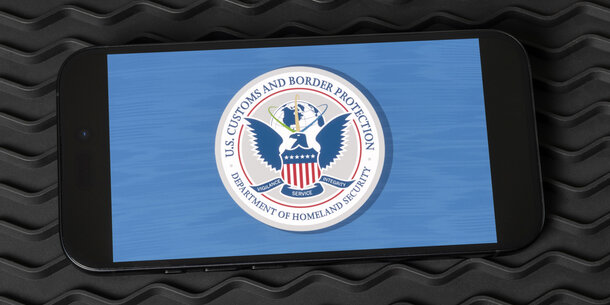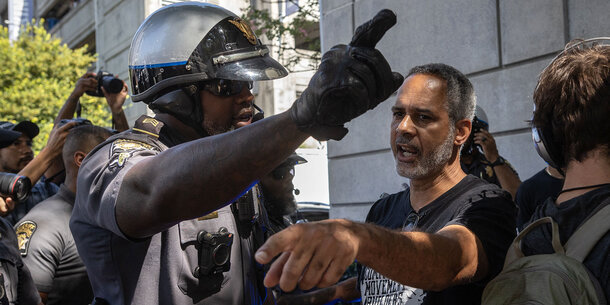In an effort to increase transparency and accountability for how police monitor people on social media, today the Brennan Center and Data for Black Lives sued the Washington, DC, Metropolitan Police Department to enforce a public records request seeking information about the MPD’s use of social media.
The request is one of a series that we filed in 2020 seeking answers from police departments in five major cities about how their officers use social media for surveillance, public safety, and other activities.
Across the country, police use social media platforms like Facebook, Twitter, and Instagram to gather information about people, groups, or activities. Police departments might manually search social media posts or create accounts to connect with individuals or groups without identifying themselves as law enforcement, even though that practice violates the terms of service of at least one major social media platform, Facebook, as the company (now named Meta) recently reiterated in a public letter to the Los Angeles Police Department.
Police departments also use third-party programs to identify and compile social media information based on keywords, geographic location, or other data to identify connections between individuals and to track people from social media to other sites they visit. Although several major social media companies announced in 2016 that these tools violated their rules, it appears at least some are still marketed to and used by law enforcement.
Moreover, social media monitoring is a powerful tool that can be easily abused, putting people’s privacy and free speech rights at risk — especially in communities of color. So in Boston, New York City, Los Angeles, Baltimore, and Washington, we’ve demanded documents related to police departments’ policies, how they use social media in criminal and other contexts, their record-keeping and safeguards against abuse, and more. This information is essential for public oversight and control of law enforcement.
The District of Columbia MPD produced only a handful of documents. And we received nothing further after we submitted an administrative appeal to the Mayor’s Office two months ago. By contrast, we’ve received hundreds of pages from the New York City and Boston police departments — though our efforts to obtain more responsive records are ongoing — and obtained a representation from the Baltimore Police Department that it no longer uses any third-party tools to monitor social media. By filing our lawsuit, we join other local journalists and activists in pushing the MPD to comply with its FOIA obligations despite a history of avoidance.
In Los Angeles, documents published by the Brennan Center revealed that the LAPD used a third-party vendor, Geofeedia, to search social media for information about Black Lives Matter activists and protests against police violence, using numerous hashtags to identify their posts. Although Geofeedia ceased operations several years ago, in 2021, the LAPD added a new social media surveillance tool called Media Sonar, which can build detailed profiles on individuals and identify links between them.
The documents also show that the LAPD instructs its officers to broadly collect social media account information from people they encounter in person using field interview cards. Additional documents we released show LAPD tried other tools — Voyager Analytics and ABTShield — capable of collecting vast amounts of personal data.
In Boston, a public records request from the ACLU of Massachusetts revealed that the police used Geofeedia software to monitor Muslim communities across several social media platforms, tracking commonplace Arabic words like “ummah” — which means community — as well as “#MuslimLivesMatter.” The Boston Police Department also monitored protesters against police violence, looking for the phrases “black lives matter,” “Ferguson,” and “protest.”
In Baltimore, the police used Geofeedia to monitor the social media posts and locations of protesters in the wake of Freddie Gray’s death in 2015. And in Washington, the police department contracted with Dataminr, yet another surveillance software company.
Social media surveillance has also resulted in concrete harms to minority communities. In one troubling case, the New York City Police Department arrested Jelani Henry for attempted murder based largely on his social media associations and pictures with members of a local “crew.” Jelani was only connected to the group through his proximity — both online and offline — to his brother and other neighborhood friends who were members. He spent two years in jail, including nine months in solitary confinement, before his case was ultimately dropped. In prior years, the NYPD notoriously swept through Harlem and the Bronx conducting mass arrests of Black and Latino men, many of whom faced criminal conspiracy charges based heavily on posts and “likes” on social media.
These stories raise significant concerns about the opportunities for misuse and abuse of social media by law enforcement. Reports have only continued while our requests have been pending. In New York, for example, the NYPD reportedly used social media and facial recognition to track down a protester accused of yelling in the ear of a police officer two months earlier. In Los Angeles, the FBI alerted police to a post advocating for destruction of “blue lives matter” flags.
Similar accounts from cities across the country underscore the importance of holding police departments accountable for how they use social media and emphasize the potential for social media monitoring to chill First Amendment activities.
That’s why we’ve long called for transparency into how police use social media, clear and enforceable limitations on when it can be used, and reporting on the extent and effectiveness of monitoring.
And some police departments have made helpful strides. For example, the Austin (TX) Police Department limits social media monitoring to a small number of situations, requires supervisor approval for any use of covert accounts, and requires that information gathered for noncriminal “situational awareness” should be deleted within 14 days if there is no related criminal activity. While we might advocate for even greater restraints, it is far ahead of the many other police departments whose policies simply endorse the use of social media while imposing few to no limitations or oversight.
In the meantime, we must continue to advocate for transparency and reform, even if it means taking police departments to court. With the filing of this FOIA lawsuit, we’re signaling to police departments that we won’t rest until their social media monitoring practices are brought to light.




